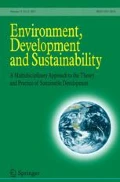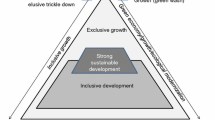Abstract
The World Summit on Sustainable Development (WSSD), held in Johannesburg during 26 August and 4 September 2002, was the biggest event of its kind organised by the United Nations to date. A major objective of the WSSD was to set out strategies for greater and more effective implementation of Agenda 21, negotiated in Rio ten years ago, than hitherto. An overview of the WSSD is presented in this chapter, including a scrutiny of its major outcomes.
Discussion begins with a detailed account of major UN environmental conferences and related events, such as Doha and Monterrey conferences, that led to the WSSD, followed by a brief discussion of the deliberations that took place at the preparatory meetings (PrepComs) of the WSSD. A detailed account and scrutiny of the following, that are the main outcomes of the WSSD, is then given.
The "Johannesburg Declaration on Sustainable Development", which is a political declaration mirroring the will of the international community to move towards sustainable development.
The "Johannesburg Plan of Implementation", which is the core document of the WSSD containing an impressive list of recommendations for accelerating the implementation of Agenda 21.
"Type II partnerships", which are projects that allow civil society to contribute to the implementation of sustainable development.
The increasingly important post-Rio issue of globalisation, which has serious implications for a number of issues directly or indirectly impinging on global sustainability, was an important element in the contextual background to the WSSD. Reference is made to some of these implications.
Type II partnerships are an innovation of the WSSD. Although a good deal of confusion persists over their precise nature and modus operandi, they were nevertheless presented at the WSSD as powerful and more democratic instruments for the realisation of Agenda 21 objectives.
The analysis shows that the Summit contributed at defining sustainable development more precisely. The Plan of Implementation is most instrumental in showing how to make resource use and the generation of pollution less unsustainable. In this way implementing the recommendations of the Johannesburg Summit offers an important defeat, worldwide.
Similar content being viewed by others
References
Bigg, T.: 2002, ‘Partnerships and WSSD: brave new world or blind valley’, The Future is Now 3, 60–72.
CDB, UN, UNEP - Convention on Biological Diversity, United Nations, United Nations Environmental Programme: 2001, Handbook of the Convention on Biological Diversity, London, UK, Earthscan.
Engfeldt, L.-G.: 2002, ‘Some highlights of the Stockholm-Rio-Johannesburg journey’, in Stockholm Thirty Years On-Proceedings from an International Conference 17-18 June 2002, Ministry of the Environment, Stockholm, Sweden, pp. 52–54.
ICS PAC-International Coalition for Sustainable Production and Consumption: 2002,Waiting for Delivery-A Civil Society Assessment of Progress Towards Sustainable Production and Consumption, Rockville, MD, Integrative Strategies Forum, 81pp.
Johnson, S.P.: 1992, The Earth Summit. The United Nations Conference on Environment and Development (UNCED), London, UK, Graham and Trotman/Martinus Nijhoff.
Orlando, B.: 1998, ‘The Kyoto protocol: a framework for the future’, SAIS Rev. 15, 105–120.
SDIN-Sustainable Development Issues Network: 2002, Paper No. 1, Taking Issue: Questioning Partnerships (http://www.sdissues.net/SDIN/docs/Takingissue-No1.pdf).
UN-United Nations: 2002, World Summit on Sustainable Development. Plan of Implementation. Advanced Unedited Text, 4 September 2002.
Upton, S.D.: 2002, ‘Challenges for international governance on sustainable development on the road ahead’, in Stockholm Thirty Years On-Proceedings from an International Conference, 17-18 June 2002, Ministry of the Environment, Stockholm, Sweden, pp. 57–58.
WCED-World Commission on Environment and Development: 1987, Our Common Future, New York, Oxford University Press.
Author information
Authors and Affiliations
Rights and permissions
About this article
Cite this article
Hens, L., Nath, B. The Johannesburg Conference. Environment, Development and Sustainability 5, 7–39 (2003). https://doi.org/10.1023/A:1025303511864
Issue Date:
DOI: https://doi.org/10.1023/A:1025303511864




